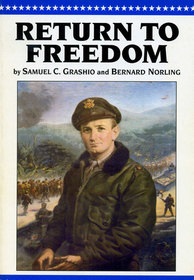Alan G. reviewed Return to Freedom: The War Memoirs of Colonel Samuel C. Grashio U.S.A.F. on + 7 more book reviews
An excellent story from one of the heroes of the greatest generation
Another outstanding memoir of an American hero who fought the Japanese in the air and on the ground in the early days of World War II in the Philippines. Finally captured, Lieutenant Sam Grashio survived the Bataan Death March and the horrendous Japanese prison camps. He then helped lead the only mass escape (12 men) from a Japanese prison camp in WW II.
He also fought with the Filipino guerrillas for seven months before leaving on a submarine to Australia and the United States, where he served the remainder of the war, due to regulations forbidding escapees from returning to combat.
(My own father also ended his participation in WW II in this manner, after he escaped from behind Japanese lines in China in early 1945. A big THANK YOU to the Chinese guerrillas for helping him and making my life possible.)
This book is also very different from other American guerrilla memoirs, in that Grashio devotes much of his memoirs examining his thoughts about the war, his participation, how he and his friends handled their POW status and the brutality of the Japanese, the assistance of the Filipino people without which they would never have survived, his frustration with U.S. red tape that prevented the true story of the POW camp horrors from being made public, and how he dealt with his temporary "fame" as an "escaped hero." Rather than being a boring philosophical reflection, his thoughts add considerably to an historical analysis of the reactions of the people from that period of American history.
This book is a definite permanent addition to my history library with its many other books on American guerrillas in the Philippines.
He also fought with the Filipino guerrillas for seven months before leaving on a submarine to Australia and the United States, where he served the remainder of the war, due to regulations forbidding escapees from returning to combat.
(My own father also ended his participation in WW II in this manner, after he escaped from behind Japanese lines in China in early 1945. A big THANK YOU to the Chinese guerrillas for helping him and making my life possible.)
This book is also very different from other American guerrilla memoirs, in that Grashio devotes much of his memoirs examining his thoughts about the war, his participation, how he and his friends handled their POW status and the brutality of the Japanese, the assistance of the Filipino people without which they would never have survived, his frustration with U.S. red tape that prevented the true story of the POW camp horrors from being made public, and how he dealt with his temporary "fame" as an "escaped hero." Rather than being a boring philosophical reflection, his thoughts add considerably to an historical analysis of the reactions of the people from that period of American history.
This book is a definite permanent addition to my history library with its many other books on American guerrillas in the Philippines.




